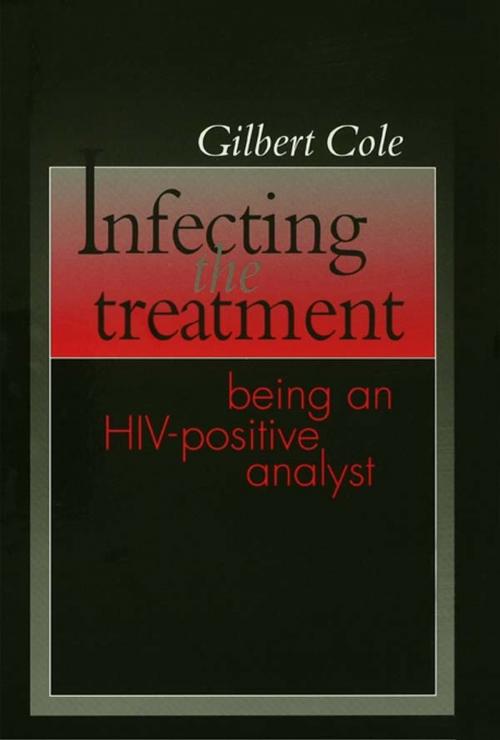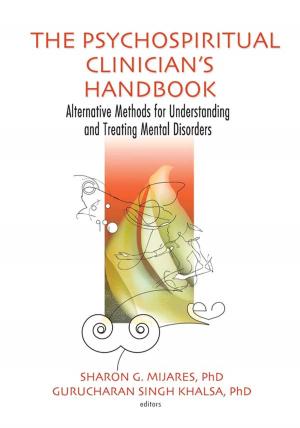Infecting the Treatment
Being an HIV-Positive Analyst
Nonfiction, Health & Well Being, Health, Ailments & Diseases, AIDs & HIV, Psychology, Psychotherapy| Author: | Gilbert Cole | ISBN: | 9781135061289 |
| Publisher: | Taylor and Francis | Publication: | April 15, 2013 |
| Imprint: | Routledge | Language: | English |
| Author: | Gilbert Cole |
| ISBN: | 9781135061289 |
| Publisher: | Taylor and Francis |
| Publication: | April 15, 2013 |
| Imprint: | Routledge |
| Language: | English |
The revelation of being HIV positive continues to be a discourse fraught with meaning. In Infecting the Treatment: Being an HIV-Positive Analyst, Gilbert Cole offers an intimate and deeply insightful examination of disclosure of his HIV seropositivity on his analytic sense of self and on his clinical work with patients.
Cole begins his journey of discovery by meditating on the meanings that being HIV positive have had for him, and by situating these personal meanings within the multiple meanings of HIV seropositivity generated by our culture, leading to a clinical discussion of the pros and cons of disclosure to one's patients. What begins as a consideration of disclosure of an ostensibly medical fact, opens to an exploration of the broader problematic of disclosure in the context of questions of sameness and difference, of dependence and autonomy, and of the ethical ground of psychoanalytic practice. He illuminates these issues by circling back to his own predicament, which took the form of an apparent conflict between his self-image as a psychoanalytic therapist committed to a psychoanalytic treatment approach and aspects of his self-experience that seemed uncomfortably dissonant with this identity and this commitment. He approached resolution of this conflict when he became able to use his HIV seropositivity as a metaphor for aspects of the treatment process.
Comprising Cole's personal engagement of the issues inherent in being an HIV-positive analyst, his report of clinical work attendant to disclosure of his condition, and a research project compiling the experiences of other HIV-positive analysts, Infecting the Treatment is an intimate and deeply insightful examination of the impact of one analyst's disclosure of HIV seropositivity on his analytic sense of self. With admirable candor and uncommon thoughtfulness, Cole shows how the analyst's disclosure of information of the most meaningful sort may deepen and even transform the therapeutic dialogue.
The revelation of being HIV positive continues to be a discourse fraught with meaning. In Infecting the Treatment: Being an HIV-Positive Analyst, Gilbert Cole offers an intimate and deeply insightful examination of disclosure of his HIV seropositivity on his analytic sense of self and on his clinical work with patients.
Cole begins his journey of discovery by meditating on the meanings that being HIV positive have had for him, and by situating these personal meanings within the multiple meanings of HIV seropositivity generated by our culture, leading to a clinical discussion of the pros and cons of disclosure to one's patients. What begins as a consideration of disclosure of an ostensibly medical fact, opens to an exploration of the broader problematic of disclosure in the context of questions of sameness and difference, of dependence and autonomy, and of the ethical ground of psychoanalytic practice. He illuminates these issues by circling back to his own predicament, which took the form of an apparent conflict between his self-image as a psychoanalytic therapist committed to a psychoanalytic treatment approach and aspects of his self-experience that seemed uncomfortably dissonant with this identity and this commitment. He approached resolution of this conflict when he became able to use his HIV seropositivity as a metaphor for aspects of the treatment process.
Comprising Cole's personal engagement of the issues inherent in being an HIV-positive analyst, his report of clinical work attendant to disclosure of his condition, and a research project compiling the experiences of other HIV-positive analysts, Infecting the Treatment is an intimate and deeply insightful examination of the impact of one analyst's disclosure of HIV seropositivity on his analytic sense of self. With admirable candor and uncommon thoughtfulness, Cole shows how the analyst's disclosure of information of the most meaningful sort may deepen and even transform the therapeutic dialogue.















